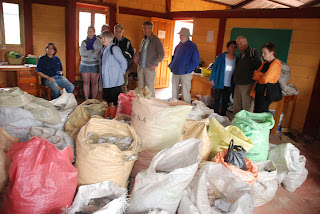I've been back in Canada for four days and I think it's
taken just about this long for the enormity and emotional impact of the
trip to sink in. It was a truly humbling experience to see how the
people of Chiapas live: To hear them share the stories of their
struggles as well as their successes. Horizons of Friendship, an
organization supported by the OPSEU Social Justice Fund, is doing
amazing work with grassroots organizations in Chiapas and makes a huge
difference in the lives of the people there. One particular project was
to help the indigenous coffee farmers of the region to organize and
form a co-operative. This co-operative now sells coffee both locally
and internationally providing a sustainable income to the community.
As much as there are many differences between the struggles we face here in Canada and those in Chiapas there are also many similarities. As a union, OPSEU strives to protect the basic human rights not just of members but also of the broader population. The organizations in Chiapas are striving for the same things as we are here in Ontario, although in Chiapas the struggle is much more apparent. The government there openly discriminates against people and uses a military presence as a way to maintain control. By supporting Horizons of Friendship, OPSEU is supporting the people in Chiapas as they learn to advocate for themselves, problem solve and become self-sustaining. We are assisting them as they stand up to a government that is treating them unjustly. The people of Chiapas are organizing to create positive social changes for now and future generations.
I would like to thank all the members of OPSEU for their continued support of these endeavors as well as for allowing me the chance to go and witness the work that our union supports. I also wish at this time to convey the many heartfelt thanks from the people of Chiapas to OPSEU members. Please be aware that your support is greatly appreciated by the people of this region. A full report of the trip will be ready by OPSEU Convention. Please pick up your copy at the Social Justice Fund booth. Please also check out our partners' websites to learn more about the great work you?re supporting in Chiapas.
Thanks
Kaylan Bartholomew
As much as there are many differences between the struggles we face here in Canada and those in Chiapas there are also many similarities. As a union, OPSEU strives to protect the basic human rights not just of members but also of the broader population. The organizations in Chiapas are striving for the same things as we are here in Ontario, although in Chiapas the struggle is much more apparent. The government there openly discriminates against people and uses a military presence as a way to maintain control. By supporting Horizons of Friendship, OPSEU is supporting the people in Chiapas as they learn to advocate for themselves, problem solve and become self-sustaining. We are assisting them as they stand up to a government that is treating them unjustly. The people of Chiapas are organizing to create positive social changes for now and future generations.
I would like to thank all the members of OPSEU for their continued support of these endeavors as well as for allowing me the chance to go and witness the work that our union supports. I also wish at this time to convey the many heartfelt thanks from the people of Chiapas to OPSEU members. Please be aware that your support is greatly appreciated by the people of this region. A full report of the trip will be ready by OPSEU Convention. Please pick up your copy at the Social Justice Fund booth. Please also check out our partners' websites to learn more about the great work you?re supporting in Chiapas.
Thanks
Kaylan Bartholomew


















